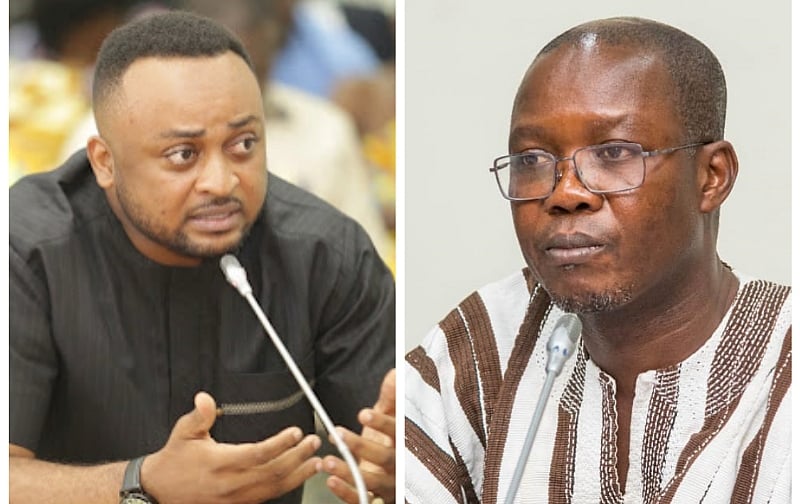The incident on the floor of Ghana’s Parliament on Tuesday, June 10, 2024, sparked controversy and criticism regarding the conduct of First Deputy Speaker Bernard Ahiafor. The clash between Mr. Ahiafor and Dr. Nana Ayew Afriyie, the Ranking Member on the Health Committee, stemmed from an urgent statement delivered by Dr. Afriyie concerning the ongoing strike by the Ghana Registered Nurses and Midwives Association (GRNMA). Mr. Ahiafor, who also serves as the NDC MP for Akatsi South, accused Dr. Afriyie of abusing his parliamentary privilege during his statement and subsequently ordered the Marshal of Parliament to escort the Effiduase-Asokore MP out of the chamber. This action ignited a firestorm of reactions, notably from Old Tafo MP, Vincent Ekow Assafuah, who strongly condemned the Deputy Speaker’s actions.
Mr. Assafuah, in a Facebook post published later that day, characterized Mr. Ahiafor’s behavior as arrogant, intolerant, undemocratic, and reminiscent of a colonial-era lawyer. He questioned the Deputy Speaker’s decision to silence a fellow MP simply because he held the presiding chair, and criticized his resort to using the Marshals “at the slightest provocation.” Mr. Assafuah’s post reflected a broader concern about the potential suppression of free speech within the parliamentary chamber and highlighted the importance of upholding democratic principles, even in the face of disagreement. The incident underscores the delicate balance between maintaining order and respecting the right of MPs to express their views, particularly on matters of national importance like the GRNMA strike.
The GRNMA strike, which served as the backdrop to this parliamentary clash, is a pressing issue impacting Ghana’s healthcare system. Dr. Afriyie’s urgent statement likely aimed to address the concerns of the striking nurses and midwives and to seek solutions to the ongoing labor dispute. The Deputy Speaker’s intervention and subsequent expulsion of Dr. Afriyie potentially cut short a crucial discussion on a critical national issue. This raises questions about whether the action was justified and whether it served the best interests of the Ghanaian people. The incident highlights the potential for parliamentary procedures to be used to stifle debate and suppress dissenting voices, a situation that poses a threat to the principles of democratic governance.
Mr. Assafuah’s criticism of Mr. Ahiafor’s conduct extends beyond the immediate incident to encompass broader concerns about the state of parliamentary decorum and the respect afforded to members. His comparison of the Deputy Speaker to a “colonial-era lawyer” evokes a historical context where dissent was often suppressed and authoritarianism prevailed. This comparison serves to emphasize the perceived severity of Mr. Ahiafor’s actions and highlights the importance of upholding democratic principles in contemporary Ghana. The incident raises questions about the role and responsibilities of the Deputy Speaker in maintaining order while simultaneously ensuring the freedom of expression for all members of Parliament.
The use of the Marshal to remove Dr. Afriyie from the chamber further escalated the situation and contributed to the perception of an overreaction on the part of the Deputy Speaker. While the Marshal plays a vital role in maintaining order and security within Parliament, their involvement in this instance arguably exacerbated the tension and created an atmosphere of intimidation. Mr. Assafuah’s questioning of when Mr. Ahiafor “became this arrogant” suggests a perceived shift in the Deputy Speaker’s demeanor and a departure from established norms of parliamentary conduct. This perception underscores the need for consistent and impartial application of parliamentary rules and procedures to ensure fairness and maintain the integrity of the legislative process.
The incident involving Mr. Ahiafor and Dr. Afriyie serves as a microcosm of broader challenges facing parliamentary democracy in Ghana. It highlights the tension between maintaining order and respecting freedom of speech, the potential for abuse of power, and the importance of upholding democratic principles in all aspects of governance. The public reaction to this incident, as exemplified by Mr. Assafuah’s strong condemnation, emphasizes the need for accountability and transparency within Parliament and the expectation that elected officials will conduct themselves in a manner befitting their office. The incident also underscores the critical role of a free press and active citizenry in holding those in power accountable and ensuring that the principles of democracy are upheld.


